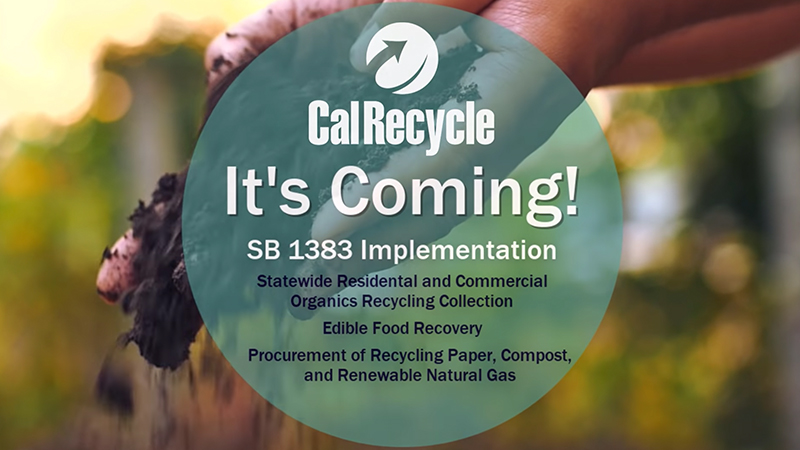
Short-Lived Climate Pollutants (SLCP): Organic Waste Methane Emissions Reductions
General Information
In September 2016, Governor Brown signed into law SB 1383 (Lara, Chapter 395, Statutes of 2016), establishing methane emissions reduction targets in a statewide effort to reduce emissions of short-lived climate pollutants (SLCP) in various sectors of California's economy. The new law codifies the California Air Resources Board's Short-Lived Climate Pollutant Reduction StrategyPDF download

, established pursuant to SB 605 (Lara, Chapter 523, Statutes of 2014), to achieve reductions in the statewide emissions of short-lived climate pollutants. Actions to reduce short-lived climate pollutants are essential to address the many impacts of climate change on human health, especially in California's most at-risk communities, and on the environment.
As it pertains to CalRecycle, SB 1383 establishes targets to achieve a 50 percent reduction in the level of the statewide disposal of organic waste from the 2014 level by 2020 and a 75 percent reduction by 2025. The law grants CalRecycle the regulatory authority required to achieve the organic waste disposal reduction targets and establishes an additional target that not less than 20 percent of currently disposed edible food is recovered for human consumption by 2025.
Methane emissions resulting from the decomposition of organic waste in landfills are a significant source of greenhouse gas (GHG) emissions contributing to global climate change. Organic materials--including waste that can be readily prevented, recycled, or composted--account for a significant portion of California's overall waste stream. Food waste alone accounts for approximately 17-18 percent of total landfill disposal. Increasing food waste prevention, encouraging edible food rescue, and expanding the composting and in-vessel digestion of organic waste throughout the state will help reduce methane emissions from organic waste disposed in California's landfills. In addition, compost has numerous benefits including water conservation, improved soil health, and carbon sequestration. Anaerobic digestion produces biogas that can be used to create electricity or renewable transportation fuels. Food rescue has the added benefit of assisting Californians who are unable to secure adequate, healthy food by diverting edible food to food banks and pantries.
SB 1383 builds upon California's leading commitments to reduce greenhouse gas emissions and air pollution statewide. Governor Brown identified reductions of short-lived climate pollutant emissions, including methane emissions, as one of five key climate change strategy pillars necessary to meet California’s target to reduce GHG emissions 40 percent below 1990 levels by 2030 as established in SB 32 (Pavley, Chapter 249, Statutes of 2016). SB 1383 will further support California’s efforts to achieve the statewide 75 percent recycling goal by 2020 established in AB 341 (Chesbro, Chapter 476, Statutes of 2011) and strengthen the implementation of mandatory commercial organics recycling established in AB 1826 (Chesbro, Chapter 727, Statutes of 2014).

For more information about the SB 1383 go to: https://www.calrecycle.ca.gov/climate/slcp

